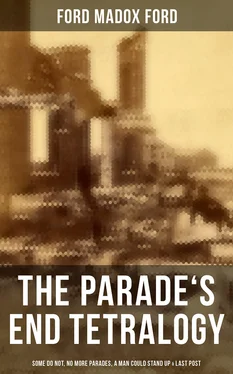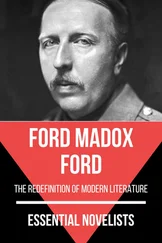Macmaster was not unpleasurably aware that these two fellows treated him with a certain deference. They had seen Macmaster being talked to familiarly by General Lord Campion. Indeed, they and the car had been kept waiting whilst the General patted their fellow guest on the shoulder; held his upper arm and spoke in a low voice into his ear . . .
But that was the only pleasure that Macmaster got out of it.
Yes, the day had begun disastrously with Sylvia’s letter; it ended—if it was ended!—almost more disastrously with the General’s eulogy of that woman. During the day he had nerved himself to having an immensely disagreeable scene with Tietjens. Tietjens must divorce the woman; it was necessary for the peace of mind of himself, of his friends, of his family; for the sake of his career; in the very name of decency!
In the meantime Tietjens had rather forced his hand. It had been a most disagreeable affair. They had arrived at Rye in time for lunch—at which Tietjens had consumed the best part of a bottle of Burgundy. During lunch Tietjens had given Macmaster Sylvia’s letter to read, saying that, as he should later consult his friend, his friend had better be made acquainted with the document.
The letter had appeared extraordinary in its effrontery, for it said nothing. Beyond the bare statement, ‘I am now ready to return to you,’ it occupied itself simply with the fact that Mrs Tietjens wanted—could no longer get on without—the services of her maid, whom she called Hullo Central. If Tietjens wanted her, Mrs Tietjens, to return to him he was to see that Hullo Central was waiting on the doorstep for her, and so on. She added the detail that there was no one else , underlined, she could bear round her while she was retiring for the night. On reflection Macmaster could see that this was the best letter the woman could have written if she wanted to be taken back; for, had she extended herself into either excuses or explanations, it was ten chances to one Tietjens would have taken the line that he couldn’t go on living with a woman capable of such a lapse in taste. But Macniaster had never thought of Sylvia as wanting in savoir faire .
It had, none the less, hardened him in his determination to urge his friend to divorce. He had intended to begin this campaign in the fly, driving to pay his call on the Rev. Mr Duchemin, who; in early life, had been a personal disciple of Mr Ruskin and a patron and acquaintance of the poet-painter, the subject of Macmaster’s monograph. On this drive Tietjens preferred not to come. He said that he would loaf about the town and meet Macmaster at the golf club towards four-thirty. He was not in the mood for making new acquaintances. Macmaster, who knew the pressure under which his friend must be suffering, thought this reasonable enough, and drove off up Iden Hill by himself.
Few women had ever made so much impression on Macmaster as Mrs Duchemin. He knew himself to be in a mood to be impressed by almost any woman, but he considered that that was not enough to account for the very strong influence she at once exercised over him. There had been two young girls in the drawing-room when he had been ushered in, but they had disappeared almost simultaneously, and although he had noticed them immediately afterwards riding past the window on bicycles, he was aware that he would not have recognized them again. From her first words on rising to greet him: ‘Not the Mr Macmaster!’ he had had eyes for no one else.
It was obvious that the Rev. Mr Duchemin must be one of those clergymen of considerable wealth and cultured taste who not infrequently adorn the Church of England. The rectory itself, a great, warm-looking manor house of very old red brick, was abutted on to by one of the largest tithe barns that Macmaster had ever seen; the church itself, with a primitive roof of oak shingles, nestled in the corner formed by the ends of rectory and tithe barn, and was by so much the smallest of the three and so undecorated that but for its little belfry it might have been a good cow-byre. All three buildings stood on the very edge of the little row of hills that looks down on the Romney Marsh; they were sheltered from the north wind by a great symmetrical fan of elms and from the south-west by a very tall hedge and shrubbery, all of remarkable yews. It was, in short, an ideal cure of souls for a wealthy clergyman of cultured tastes, for there was not so much as a peasant’s cottage within a mile of it.
To Macmaster, in short, this was the ideal English home. Of Mrs Duchemin’s drawing-room itself, contrary to his habit, for he was sensitive and observant in such things, he could afterwards remember little except that it was perfectly sympathetic. Three long windows gave on to a perfect lawn, on which, isolated and grouped, stood standard rose trees, symmetrical half globes of green foliage picked out with flowers like bits of carved pink marble. Beyond the lawn was a low stone wall; beyond that the quiet expanse of the marsh shimmered in the sunlight.
The furniture of the room was, as to its woodwork, brown, old, with the rich softnesses of much polishing with beeswax. What pictures there were Macmaster recognized at once as being by Simeon Solomon, one of the weaker and more frail aesthetes—aureoled, palish heads of ladies carrying lilies that were not very like lilies. They were in the tradition—but not the best of the tradition. Macmaster understood—and later Mrs Duchemin confirmed him in the idea—that Mr Duchemin kept his more precious specimens of work in a sanctum, leaving to the relatively public room, good-humouredly and with slight contempt, these weaker specimens. That seemed to stamp Mr Duchemin at once as being of the elect.
Mr Duchemin in person was, however, not present; and there seemed to be a good deal of difficulty in arranging a meeting between the two men. Mr Duchemin, his wife said, was much occupied at the week-ends. She added, with a faint and rather absent smile, the word, ‘Naturally.’ Macmaster at once saw that it was natural for a clergyman to be much occupied during the week-ends. With a little hesitation Mrs Duchemin suggested that Mr Macmaster and his friend might come to lunch on the next day—Saturday. But Macmaster had made an engagement to play the foursome with General Campion—half the round from twelve till one-thirty: half the round from three to half-past four. And, as their then present arrangements stood, Macmaster and Tietjens were to take the 6.30 train to Hythe; that ruled out either tea or dinner next day.
With sufficient, but not too extravagant regret, Mrs Duchemin raised her voice to say:
‘Oh dear! Oh dear! But you must see my husband and the pictures after you have come so far.’
A rather considerable volume of harsh sound was coming through the end wall of the room—the barking of dogs, apparently the hurried removal of pieces of furniture or perhaps of packing cases, guttural ejaculations. Mrs Duchemin said, with her far-away air and deep voice:
‘They are making a good deal of noise. Let us go into the garden and look at my husband’s roses, if you’ve a moment more to give us.’
Macmaster quoted to himself:
‘“I looked and saw your eyes in the shadow of your hair . . . "’
There was no doubt that Mrs Duchemin’s eyes, which were of a dark, pebble blue, were actually in the shadow of her blue-black, very regularly waved hair. The hair came down on the square, low forehead. It was a phenomenon that Macmaster had never before really seen, and, he congratulated himself, this was one more confirmation—if confirmation were needed!—of the powers of observation of the subject of his monograph!
Читать дальше












